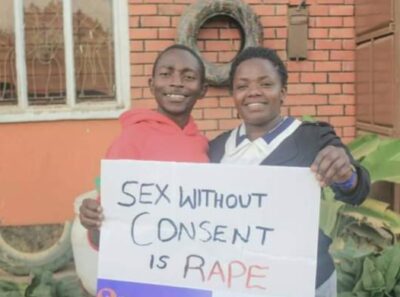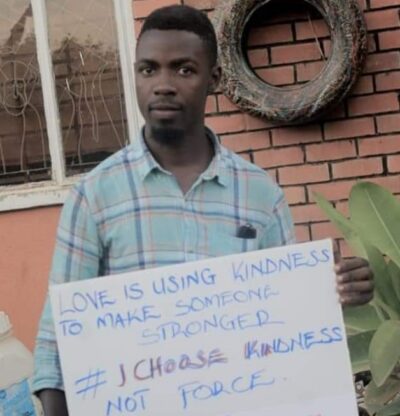How a 21-year-old girl faces injustice and community stigma after reporting rape.
BY MOLLY KAMAKUNE

Amooti Sarah, a 21-year-old resident of Fort Portal City (not her real name), tragically became a victim of gender-based violence during the 2023 festive season, enduring sexual abuse that almost cost her life.
The harrowing ordeal unfolded on the evening of December 26th, when her boyfriend (whose name is withheld due to the ongoing investigation) agreed to accompany her to a music concert organized in Fort Portal City.
“It was my boyfriend who called me to go and attend a music concert. It was around 6 pm on the 26th of December. We agreed to go together, and we left town to attend the concert. However, on reaching the entrance, I couldn’t see him anymore. I paid the entrance fee (Shs 10,000) for myself,” she recounted.
After a short while at the venue, her boyfriend returned and joined her. She mentioned that at that time, she was experiencing stomach discomfort due to her menstrual period, a fact he was aware of.
“When he came back, he had bought me a drink, but I felt suspicious and refused it. The drink was in a disposable cup. Strangely, when I declined, he also chose not to drink it and poured it out. I remained confused,” she recounted.
She shared that they stayed together until 3 am that night at the concert, and afterward, when they reached his home and she was about to shower, the boyfriend unexpectedly approached her and began touching her private parts.
“When I resisted his advances, he sat back briefly but then insisted that I leave his house. Fearing the dangers of the night, with nowhere else to go, I refused to leave. However, my refusal led to an escalation of violence as he vehemently demanded sexual compliance. He began beating me severely,” she recounted.
She said the man used gym rope in his house to inflict further harm, causing her to become weak from the injuries.
Unable to defend herself any longer, she was tragically raped throughout the night. Later, when the man finally slept in the early morning hours, she managed to escape and went to seek help, she went to the boyfriend’s parents and reported the incident.
She revealed that the boyfriend’s father acknowledged having heard scuffles and noise in the night and assured her that he would address the matter.
She pointed out that the injuries she sustained were widespread, including her face, as the man had used wire ropes items to beat her.
When the boyfriend’s father confronted his son about the brutalization, he callously replied that she should seek justice from the police. Shockingly, she was warned that even if she reported the incident, no action would be taken against him.
” After reporting the incident to his father, I feel so angry in my heart because I went to the police to file a case. I was assured that investigations would commence, but to date, I have not received justice, I feel am cheated and have no energy to fight back. I wish I was able to fight back since all the people I tell my pain, they just laugh it off like its normal and okay” she lamented.
As news of her story spread within the community, she faced harsh judgment. Some community members accused her of being in the wrong, ridiculing her and alleging that she was attempting to swindle men of their money.
Furthermore, she was subjected to baseless accusations of faking her menstrual periods.
In Uganda, the legal age for consent is set at 18 years. Any individual above this age is recognized as having the legal capacity to give consent. Conversely, for those below 18 years, there is no right to provide consent as they lack the legal capacity for decision-making. Engaging in any sexual activities with a minor is strictly against the law and is charged as defilement.
Rape is unequivocally regarded as a criminal offense in Uganda, as stipulated by the Penal Code Act Section 123. The act defines rape as the unlawful carnal knowledge of a woman or girl, with or without her consent. Consent, in this context, must be free from force, threats, intimidation, or fear of bodily harm. Additionally, the act considers impersonation of a husband in the case of a married woman as constituting rape. The penalty for a conviction of rape in Uganda is severe, with the offender facing the possibility of the death penalty.
When engaging with members of the community on the subjects of consent and marital rape, diverse perspectives emerged. The legal framework emphasizes the importance of ensuring that any sexual activity is consensual and free from coercion or fear.
Vox pops
Mr Paul Katiisa, “I prioritize mutual respect in my relationship, and I firmly believe in respecting my wife’s boundaries. When she says no, I understand that ‘no’ means NO. It’s crucial not to misinterpret the softness in her voice as anything other than a clear refusal. For those men who resort to forcing their wives into intimacy, there might be an underlying mental health issue, and seeking medical attention or consulting with psychiatrists is essential to address the root cause.”
Ms Kajumba advocates for consensual relationships, stating, “Sex should occur between two consenting adults who are both above the age of 18 and have reached a mutual agreement. Coercion diminishes the experience for both parties involved, leading to an outcome that lacks genuine enjoyment.”
Mr Abdul Aziz expresses a differing point of view, asserting, “In a marital relationship, a woman cannot deny her husband sex. While some women may say no, it’s often perceived by men as a test of their persistence. However, it’s crucial to acknowledge and respect a woman’s boundaries and ensure that any interaction is consensual and respectful.”
Ms Miriam sheds light on the challenges faced by women in relationships, saying, “As women, we closely observe our partners, limiting their opportunities to seek satisfaction elsewhere. In the Muslim faith, a man is allowed to have up to four wives, providing an alternative perspective on marital dynamics. Nevertheless, it’s essential to ensure that all relationships, regardless of religious beliefs, are built on consent and mutual understanding.”
Kasumba Henry acknowledges a complex aspect of some marriages, stating, “Certain men find themselves in situations where they feel starved of intimacy, leading them to resort to force. This, however, should not be the solution.”



